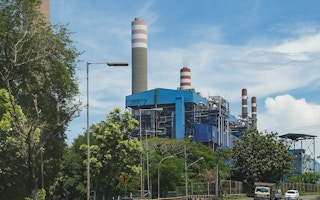As the G20 Summit of the 20 largest economies approaches, host nation Indonesia is under pressure to unhatch a more aggressive decarbonisation plan and scale back its use of coal.
To continue reading, subscribe to Eco‑Business.
There's something for everyone. We offer a range of subscription plans.
- Access our stories and receive our Insights Weekly newsletter with the free EB Member plan.
- Unlock unlimited access to our content and archive with EB Circle.
- Publish your content with EB Premium.
As the world’s biggest coal exporter and one of the largest carbon emitters, Indonesia’s role in achieving the global goal of net-zero emissions by 2050 to avoid catastrophic global warming is crucial, but the government is targeting 2060 to achieve net-zero emissions, a longer timeframe than what is needed to meet global carbon goals.
According to a new study by TransitionZero, a financial analytics non-profit, it would cost US$37 billion to retire Indonesia’s fleet of 118 coal-fired power stations, which would help the Southeast Asian country scrap its coal arsenal a decade earlier than planned, by 2040, and align with global climate goals.
This would save 1.7 billion tonnes of carbon dioxide, equivalent to almost three years of Indonesia’s annual carbon emissions.
Coal plant retirement would be less costly than subsidising coal, on which Indonesia spent US$10 billion in a single year alone, according to last year’s figures, TransitionZero calculated.
Indonesia relies on subsidised coal for power generation and guarantees a fixed fee to plant owners.
TransitionZero also estimated that coal retirement would be relatively cheap considering that the country’s first carbon capture and storage (CCUS) project, BP’s Vorwata CCUS development, is expected to cost $3 billion.
Indonesia derives about 38 per cent of its power from coal, which has been growing in the energy mix despite the government’s plan for a steep reduction, to 30 per cent of all energy sources, by 2025.
The country’s coal consumption volume is expected to increase, because of expected growth in future electricity demand from economic growth, the energy ministry said last year.
Indonesia is expected to announce a coal retirement plan around the G20 Summit in Bali next month, at which energy transition will be a key theme.
TransitionZero analyst Jacqueline Tao told Eco-Business that Indonesia’s first coal plant retirement would “be the hardest” but once the first plant is closed it would be easier to shutter others.
A “low hanging fruit” for retirement would be coal plants that serve the Java-Bali electricity grid, which has been producing about 50 per cent more energy than demand, said Tao.
Last week, Indonesia’s national energy utility, PLN, which owns and operates all of the archipelago’s transmission and distribution networks, said that ageing coal plants and those without carbon capture facilities would be prioritised for retirement.
Speaking to Eco-Business at an event in Jakarta on Tuesday, Edi Srimulyanti, PLN’s director of retail and commerce, said that coal retirement is a “long term plan” for the state utility, and any future energy capacity additions would focus on natural gas, a less polluting fossil fuel than coal.
Just transition?
Retiring coal plants will come at a cost to the 245 coal plant workers who operate each plant in Indonesia, which amounts to 1.3 jobs per megawatt (MW) at a coal plant.
However, TransitionZero’s analysis suggests that two jobs are created per MW of solar and five per MW of onshore wind, which includes construction and project development, as well as ongoing operation and maintenance.
“While not all coal plant closures will come with renewable replacement plants, it is fair to say power sector decarbonisation is likely to come with net job gains at the power plant level,” the report said.
Funding for coal retirement projects should include the re-employment and re-skilling of former coal workers, the report noted.
Next month, Indonesia is expected to be eligible for funding under the Just Energy Transition Partnership, an agreement forged by the European Union and others to aid developing countries transition to clean energy at the COP26 climate talks last year.










